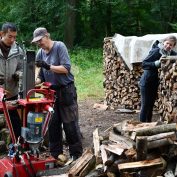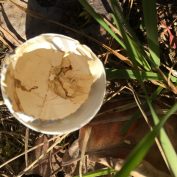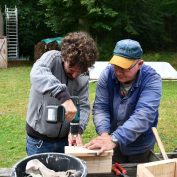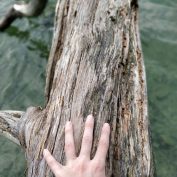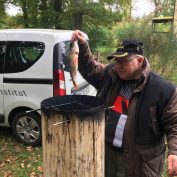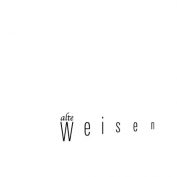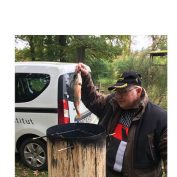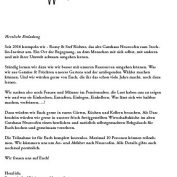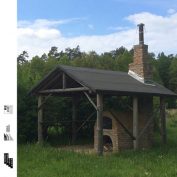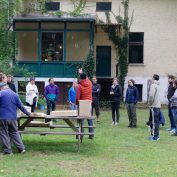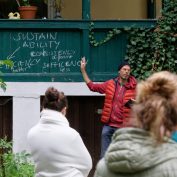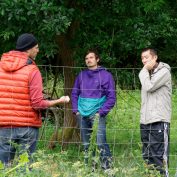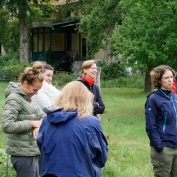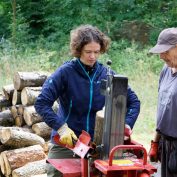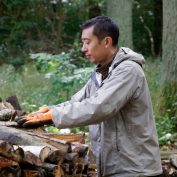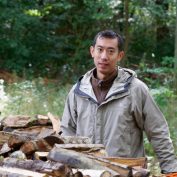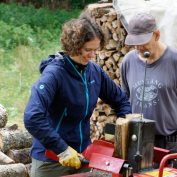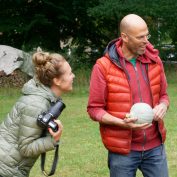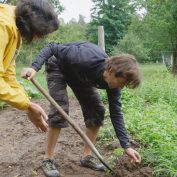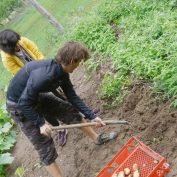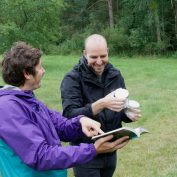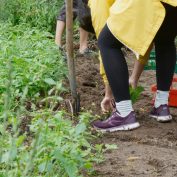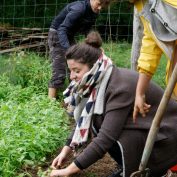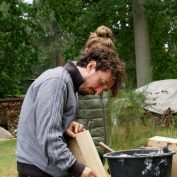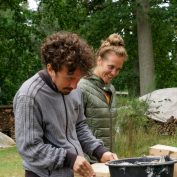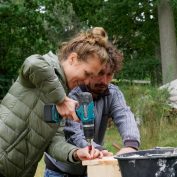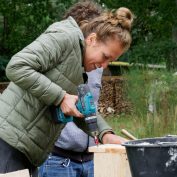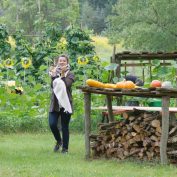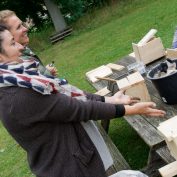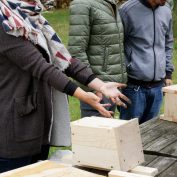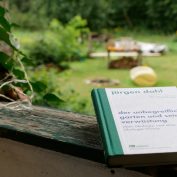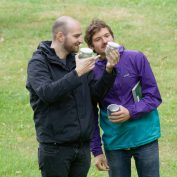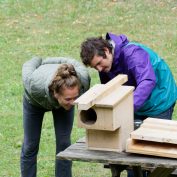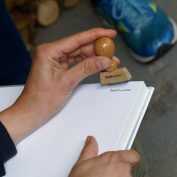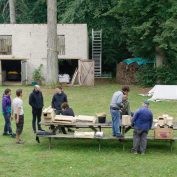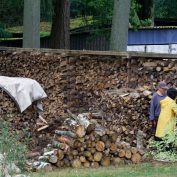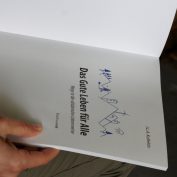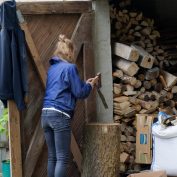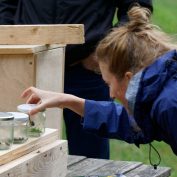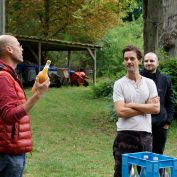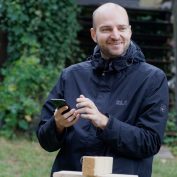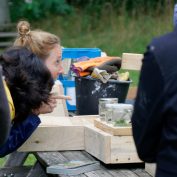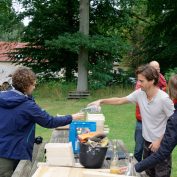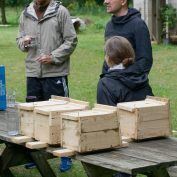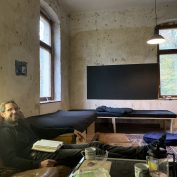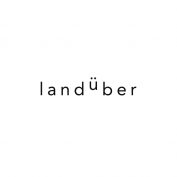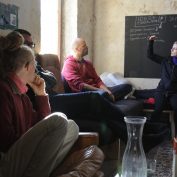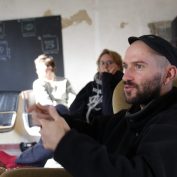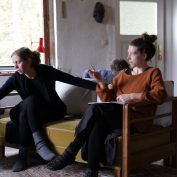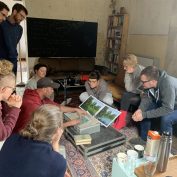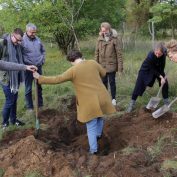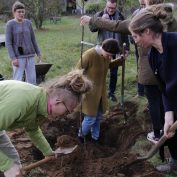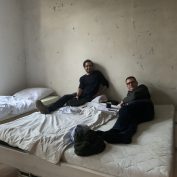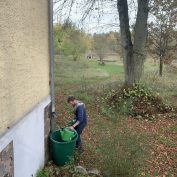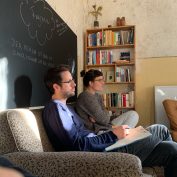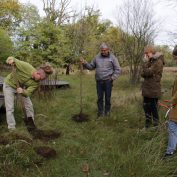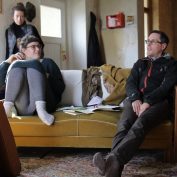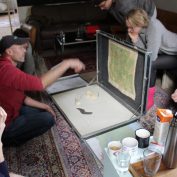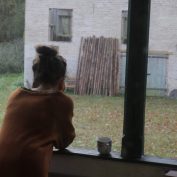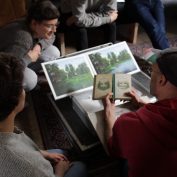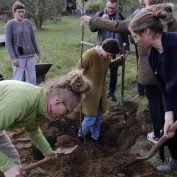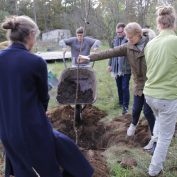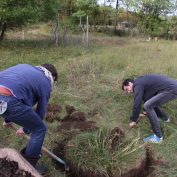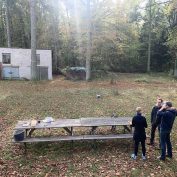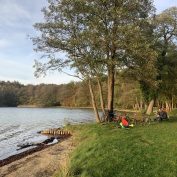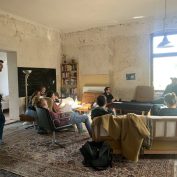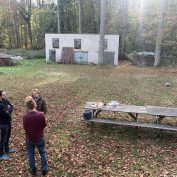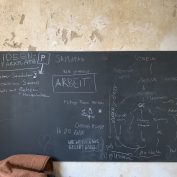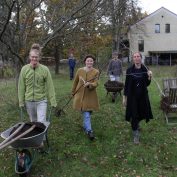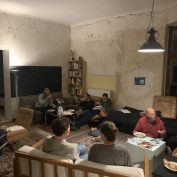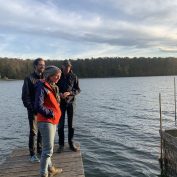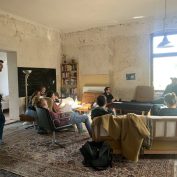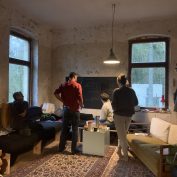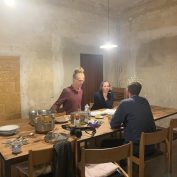Suffizient und Schön
Working at the Stechlin-Institut has sensitized us for our immediate surroundings, their history, and their inhabitants. This sparsely populated area and its people have been shaped strongly by industrialized agriculture. The more recent dismantling of relevant infrastructure has left wounds on people’s conceptions of themselves, wounds relating to the labour market, which up to now have hardly been addressed. Both, the resilience of soil and of people are damaged, and their competence for sustainability has been pushed into the private sphere where vegetables are still farmed sustainably, repair is practiced, and where „upcycling“ has remained a common practice by pure economical necessity.
On the other hand we also experience city dwellers who come to the Stechlin-Institut longing for the pastorally intact. They feel the need to avoid the pressure of urban spatial consolidation. But more fundamentally, here they look for ways out of the complete capitalization of life searching for possibilities of greater self-determination, freedom, and a sense of coherence in a unified whole.
Klimaklausur
KlimaKlausur
With KlimaKlausur we wanted to get an internal project for practitioners of socio -cultural practice on its way. Considering what often is referred to as a polycrisis, we wanted to elaborate for several days about the recalibration of the self -image of socio-cultural practice since its beginning in the 1980s – as an opportunity and possibility. Since too little return came from the approximately 800 project locations of socio -culture, we opened the project for the many that are aware of the critical condition of our planet and human society.
As different as we are, are the coping strategies that we develop to get along with threats – whether it is illness, violence, or the forecast catastrophic global changes. But what unites us as humans is the ability to share our fears, to find our way out from our stasis and to develop new perspectives as social beings. For this purpose, we initiated KlimaKlausur and test-runned it in fall 2023.
In order not to act completely without guardrails at the pilot event, we had invited two experts: a geologist who was able to introduce us to the greater time frame and to contextualize our positions as humans in the realm of nature. And secondly, an artist who introduced us to the non-human life in a collective walking performance. In several, thematically and free discussions, we have opened ourselves and made our fears tangible.
As expected, the small group size and the protected atmosphere that the Stechlin-Institut offers were perfect. As a result, we agreed that the format – especially here at our institution should be continued. It makes sense to give each other the space in order not to be alone with the pain that goes hand in hand with the continuous loss of the wealth of this world (the 6th mass-extinction) and the growing suffering for many people. The extended weekend helped us not to be consumed by our fears but to understand them and take them seriously considering ther scientific forecast ouf our dramatic future prospects. To understand that we are still able to act – as individuals and as a community.
¶
ruralMindshift
Full of enthusiasm, we have realized that we are not the only firecrackers trying to answer mass extinctions and climate catastrophe sustainably sufficiently. On the contrary, we have found many people internationally who, like us, have set out to create a place that tries to live a different life in rural areas. It is about the respectful treatment of life, nature, the environment and the other. We have found again and again that it is the commitment of individuals to be stuck in the belief in the possible and absolute necessity to go a convivial way. To acquire and acquire knowledge or to find out how a balanced coexistence with all living things is possible in order to create and test resilient places. These „autonomous“ initiatives exist all over the world, for many centuries. They were mostly pioneers or creative lone fighters and with them mostly the places and above all the knowledge were lost. Ruralmindshift is the vision to bundle, share and archive this rural commitment.
A (future) decentralised database will be fed with experience by the initiatives themselves. Medienhaus from Berlin has created this open source based system based on Matrix and made it available to Ruralmindshift. We will meet in December and enter the first data. https://www.ruralmindshift.org/
old school
On the topic of resilience, sufficiency and regeneration, we address the important group of seniors. .
Viewed through the lens of our future post-growth society, the practices of the elderly, especially those of the rural East, are gaining in relevance.To this day, their lifestyle is characterized by a highly localized productivity and an amazingly low ecological footprint. How could a society that has decided to live within the planetary guardrails (climate neutrality 2040) and also has to say goodbye to the excessiveness of unconditional globalization (Covid 19) benefit from the skills, from the measure of these people in order to discover new qualities not in the less, but in the other? A format to make relevant practices of local innovation systems visible and available, but also to pay attention to the merits of these everyday experts and to attach value to them and their life’s work.
To this end, we will visit the people in their places. In their kitchens and gardens and have conversations with them, share everyday things with them and document this in photos and audio recordings. Finally, a documentary will be published in the form of a magazine and the protagonists will be invited to the Stechlin-Institut to find a joint festive conclusion in our newly created large economic kitchen.
The DIY practices of the seniors expand the lived sustainability of the Stechlin-Institut into a place of intergenerational experiential learning for people from the countryside and from the city. Restrictions on consumption are deliberately decided in order to be overcompensated by new quality of life, such as time prosperity, and to be perceived as liberation. As soon as possible, workshops lasting several days will be offered again and impulses of sufficiency – enriched by the experience of the seniors, will be taken from here into the everyday life of the younger and young – via the villages and into the cities. As an experience of self-efficacy and as a personal contribution to a positive change towards a planetary fair post-fossil lifestyle.
Funded by the Federal Government Commissioner for Culture and the Media.
quertransfer
The Stechlin-Institut activates the social potential of artistic thinking. It enables experiences in which curiosity, eco-sufficiency and society converge, in order to encourage participation with diverse perspectives. Since 2015, the Stechlin-Institut has offered a place to non-proft organizations to focus on their work. Up to date more than 70 NGOs and a variety of artists have made use of the offer. Starting 2020 with the Sustainability Experience Program, we want to open up the place to for-profit organizations as well.
We do not have THE solution, but we do have a very contemporary approach: through the methodology of artistic thinking, the process of transformation that lies ahead of us can be made comprehensible. Complex changes ask for a number of knowledges whose perspectives need to be combined creatively. The great transformation requires new narratives and experiments.
The Stechlin-Institut is an experiment of this kind. Awarded through various funders of sustainable development, among others the council for sustainable development of the federal government of Germany, this experiment lives through our artistic perspective. Every aspect comes from creative drive. On the way to a sufficient but also beautiful future. At the Stechlin-Institut we mediate the experience that reduction doesn’t have to be felt as a loss but that sufficiency can be a quality.
When everyone speaks of disruption, we highlight our capacity for chaotic circumstances which we have been training to qualify for many years and the skill of artists to switch perspecives. We make them available for the teams of companies through the experience on site at the Stechlin-Institut.
We aim to invite companies wanting to work on sustainability goals. At the Stechlin-Institut they can experience our approach to eco-sufficiency directly and practically. Our artistic perspective poses the framework for new experiences, to trigger a reconsideration of the purpose of business, and to initiate an individual mindshift for a sustainable future.
SARS-CoV-2-virus and COVID-19
+++++++++++++++++++++++++++++++++++++++++++
The SARS-CoV-2-virus and COVID-19 also have to be considered at the SI. For your protection, we have therefore adopted the hygiene recommendations of the Robert Koch Institut and the Bundeszentrale für gesundheitliche Aufklärung. We ask you to follow these regulations during your stay.
Because of legal guidelines we can currently only allow a limited number of people to stay at the Stechlin-Institut. Please speak with us directly to find out the latest news on this.
At the Stechlin-Institut:
Please keep a mutual distance of at least 1.5 metres.
Please air the rooms regularly.
Please wash your hands thoroughly.
Please clean surfaces and objects after each use.
Please use the bathrooms one person at a time.
Please provide us with a list of full names and phone numbers of all participants. We will destroy the list after four weeks.
Many thanks and stay safe!
Romy & Stef
sxp

The Sustainability Experience Program (SXP) addresses companies and organisations. Through the program, sustainability becomes comprehensive on a practical level and it gains liveliness through the sustainability dimensions of efficiency, coherence and sufficiency.
Situated in the natural reserve of Stechlin, surrounded by forest, the Stechlin-Institut offers lasting experiences in the complex of sustainability of 1 to 3 days for groups of up to 18 people in the former manor Neu-Roofen. Events take place in our infrastructure which has been explicitly developed in a sustainable way: house, workshop, kitchen, gardens and in our comprehensive library on sustainability, biodiversity and transformation.
With its modular structure, the SXP format begins with a tour of the house and gardens and makes our sustainable approach as lived knowledge at the Stechlin Institute and its “operating system” comprehensible. In a short, memorable theory module, participants are familiarized with the fundamentals of sustainability. Then, in small teams, supported by people with different levels of expertise, “sustainability hacks” are practically carried out at individual stations. The stations are adapted to the seasons and wishes of the participants. Tricks for more domestic tasks such as chopping and stacking wood, splitting chips or carrying out minor repairs are learned. Furthermore, practical experience is gained in the implementation of permaculture in the vegetable garden. This can range from planting to harvesting and processing. The tasks and the associated increase in knowledge are always set in relation to the sustainability goals.
At other stations, the focus is on the experience of biodiversity. For example, the importance of a grasslands is explored or insect populations are observed (who has ever had an encounter with a snowball leaf beetle)? Mindfulness may sound trite. But to lie in the clearing at night with open senses, to watch the bats hunting under the unbelievably wide starry sky, makes building a nest box for bats no longer seem like trivial tinkering, but is guided by the desire to be in conscious coherence with other living beings.
Finally, each team shares their experience with the group in a lively way. What has been built, found and harvested is presented and discussed. The end of the program is celebrated with apple juice from the orchard and a jointly harvested and cooked dinner.
The goal of the SXP is to experience a systematically sustainable approach to resources – enveloped into an experience of community and coherence. A feeling which takes effect far beyond the days spent at the Stechlin-Institut.
During the pilot phase, the program can be booked at a reduced price through a subsidy of the European Social Fonds in the framework of quertransfer. More information can be obtained at info@stechlin-institut.org.
quertransferSXP No 1
LandÜber
What we want
We want to work together to make the Stechlin-Institut into place that is both, a biodiverse niche and a crystallization point of resistance. A field laboratory for digital and analogue hacks. Inside it will have a functional wood heating. Outside it practices permaculture. And we want to arrive and depart with an elegant mobility solution. We want to test communal work models. We want all this in order to write the immediate and the far future together.
The Stechlin-Institut is conceived to grow within the limitations of planetary sustainability. We understand enlightenment and modernity as a chance for sustainability. And, accordingly, we defend ourselves against attempts to monopolize the rural sphere by the likes of Nazi ideologies or business interests. We are not looking for an idyllic place, but we want to realize lasting economical life as social practice. We want soil revitalization and resource productivity and social participation instead of exploitation. We want to understand digitization culturally, using it as an opportunity to create a place where the quality of life is based on appreciation instead of value. We want to educate each other. We want to understand this place and see clearly what we are capable of doing in the current situation with our scarce means. For this place to be social, eco-sufficient, and beautiful.
The project
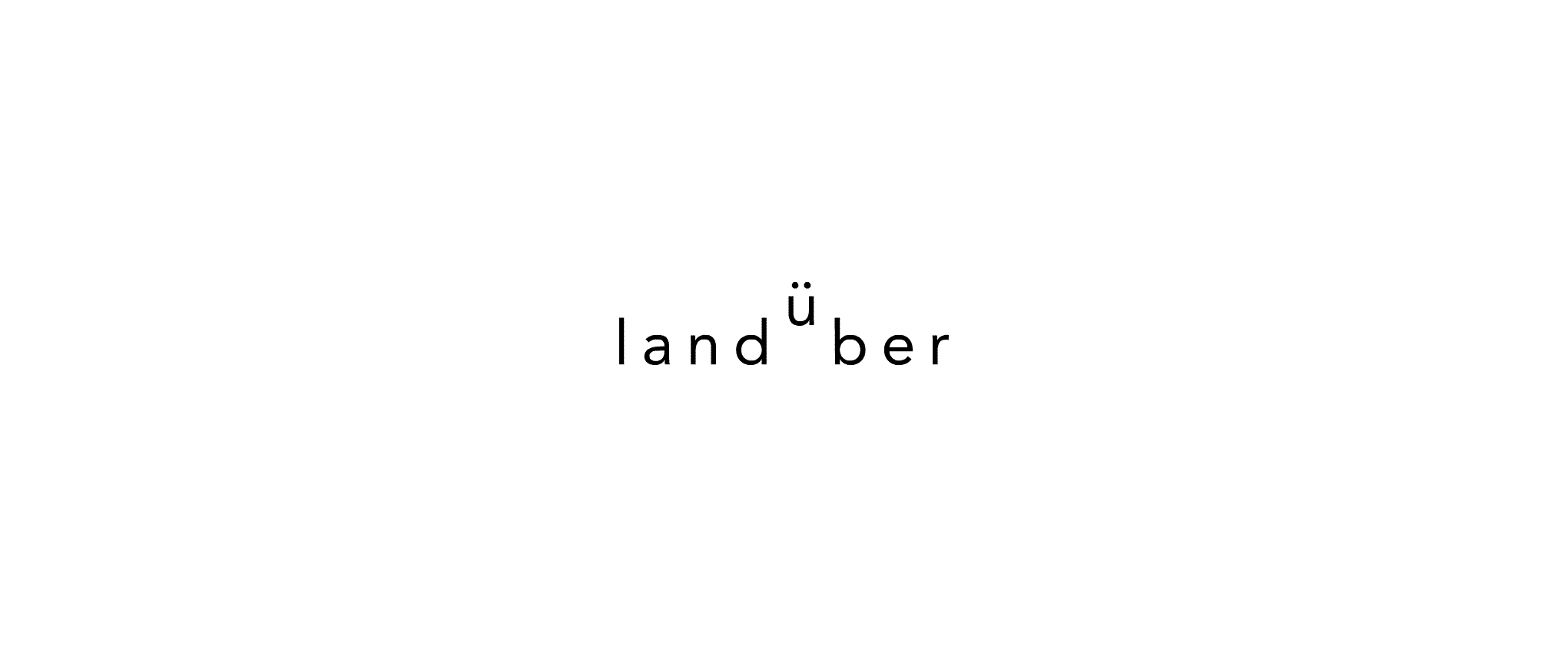
A hybrid space is emerging. Between city and countryside. It isn’t only formed spatially by new conceptions of mobility and work, but also in terms of content as an option for another kind of life with sufficiency. It is high time to fill this hybrid space with civic content oriented towards coming up with sustainable and resilient solutions for urgent problems and to also put them into exemplary practice.
With the project LandÜber we aim at exploring the potentials of socio-ecological transformations in the rural sphere in relation to the metropolis, because the renewed densification of cities, the dwindling of undetermined kinds of space, and the economizing of public space leave the countryside in specific as a projection screen for the future.
With a team of fifteen people, we will approach ideas of sustainability of life, work, mobility, and health in this hybrid space during the course of 2019 and 2020. Our conceptions do not differentiate between rural and urban as much as they connect the potentials of both „worlds“, driven by the common good instead of profit. The project is sustainably social and ecological in its constitution. All workshops are directed at the cross sections of digitization, inclusion, the dialogue between city and countryside, and the democratic state of the rural surroundings. Their practical implementation will focus on collaborations with our local partner organizations.
LandÜber works for system innovations for sustainable development in the countryside in order to establish the social and cultural dimension more fully in the ecological discourse. Attempting to transfer highly dynamic transformation processes happening in the capital city into our region, the Stechlin-Institut takes the shape of a field lab to function as a hinge between the city and the countryside. We connect people from both contexts in this one-year long endeavour. At the end of the process lies a strategy for the future.
Real-World Laboratories
No.1







